Common Mistakes to Avoid as a Beginner Day Trader
As a beginner day trader, it is crucial to understand the intricacies of the market and how to navigate it wisely. Many new traders succumb to common pitfalls that can undermine their success and lead to significant financial losses. This article will guide you through essential concepts, the mistakes to avoid, and the mental discipline required for effective day trading.
Understanding Day Trading Basics
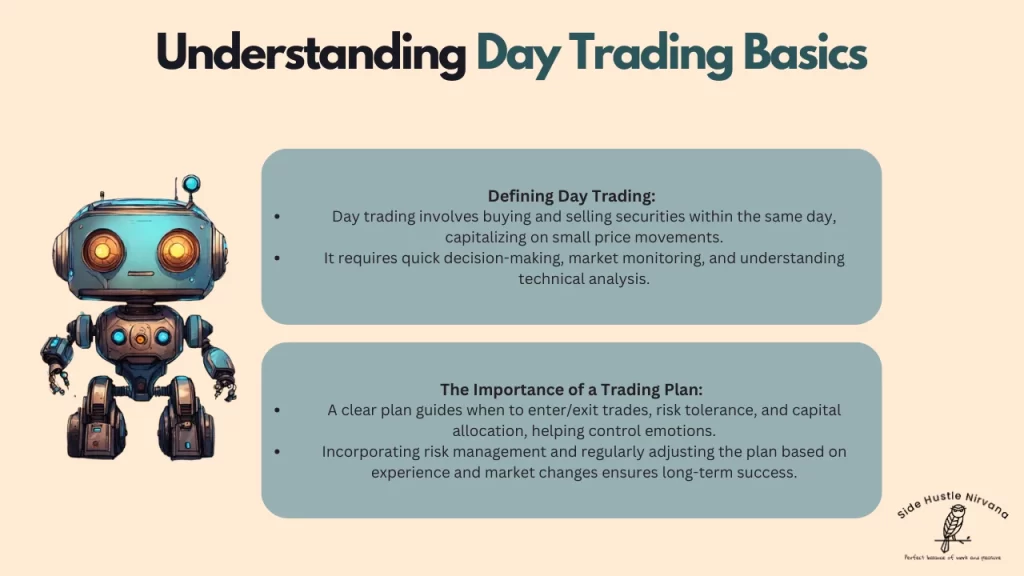
Defining Day Trading
Day trading involves the buying and selling of securities within the same trading day. Traders capitalize on small price movements in liquid stocks or currency pairs, often leveraging high volumes to maximize potential gains. Unlike long-term investors, day traders typically hold positions for just a few minutes to several hours, closing all trades by the end of the day.
This trading style necessitates a robust understanding of market dynamics, including technical analysis, stock chart reading, and the influences of broader economic indicators. Day traders must closely monitor price movements as they develop throughout the day, requiring quick thinking and decisive execution. The fast-paced nature of day trading can be exhilarating, but it also comes with significant risks; thus, traders must be prepared for the emotional rollercoaster that can accompany rapid market fluctuations.
Additionally, day traders often utilize various tools and platforms to enhance their trading strategies. Advanced charting software, real-time news feeds, and algorithmic trading systems can provide valuable insights and help traders make informed decisions. The ability to quickly analyze data and react to market changes is crucial, as even a few seconds can make a substantial difference in profit or loss.
The Importance of a Trading Plan
A well-structured trading plan is essential for any trader, especially beginners. It acts as a roadmap, providing clear guidelines on when to enter and exit trades, how much capital to invest, and risk tolerance levels. A trading plan helps to keep emotions in check and ensures that decisions are based on logic and strategy rather than impulse.
Establishing a detailed plan includes defining your trading objectives and the types of instruments you will trade. By doing so, you can systematically approach the market instead of reacting haphazardly to fluctuating prices. Moreover, a trading plan should also incorporate risk management strategies, such as setting stop-loss orders to limit potential losses and determining the maximum amount of capital to risk on each trade. This disciplined approach not only protects your investment but also fosters a more sustainable trading practice over time.
Furthermore, reviewing and adjusting your trading plan regularly is crucial as market conditions evolve. As you gain experience and learn from past trades, you may find that certain strategies work better than others, prompting you to refine your approach. Keeping a trading journal can be an invaluable tool for tracking your performance, analyzing your decision-making process, and identifying patterns that can inform future trades. This continuous improvement mindset is vital for long-term success in the competitive world of day trading.
Common Trading Mistakes and Their Consequences
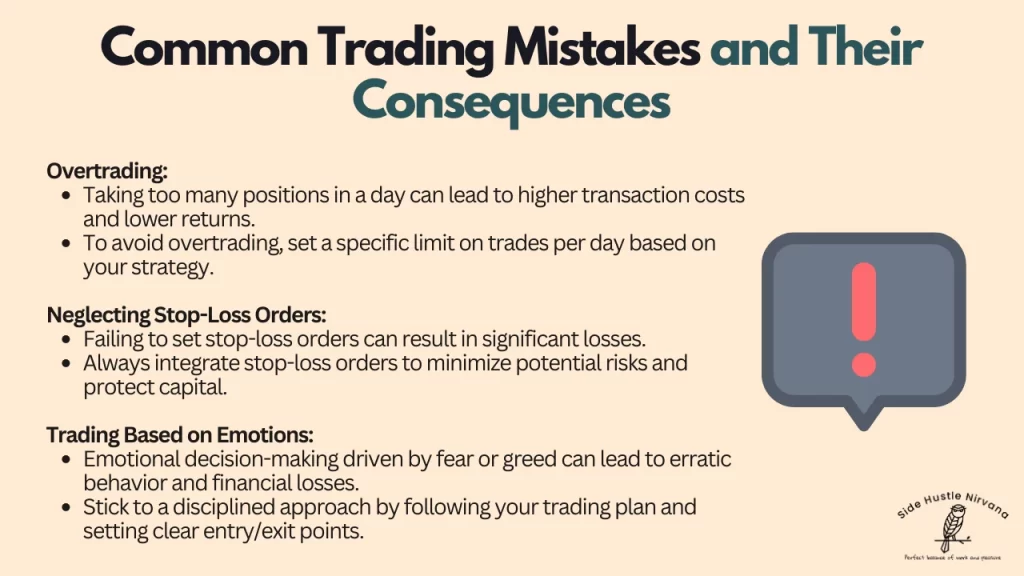
Overtrading: A Common Pitfall
One of the most significant mistakes beginners make is overtrading—taking too many positions in a single day. The excitement of trading can lead to impulsive decisions, driven by the desire to make quick profits. However, overtrading often leads to increased transaction costs and diminished returns.
To avoid this mistake, it is vital to define a specific number of trades per day based on your strategy and to stick to that limit. Quality over quantity should be the guiding principle for selecting trades.
Neglecting Stop-Loss Orders
Stop-loss orders are a critical risk management tool that every trader should utilize. Failing to set them can result in substantial losses if a trade goes against you. A stop-loss order automatically sells a position when it reaches a certain predetermined price, helping to prevent losses from spiraling out of control.
For beginners, it’s particularly important to integrate stop-loss orders into every trade, providing a safety net that can preserve capital—something that is essential for long-term trading success.
Trading Based on Emotions
Emotional decision-making is detrimental in day trading. Fear and greed are powerful motivators that can lead to erratic trading behavior—like holding onto a rapidly declining stock out of hope or jumping into a trade out of excitement. Both scenarios can result in significant financial setbacks.
To counteract emotional trading, developing a disciplined approach and adhering to your trading plan is vital. Setting clear entry and exit points can help keep emotions at bay, allowing you to execute trades based on logic instead of feelings.
The Role of Risk Management in Day Trading
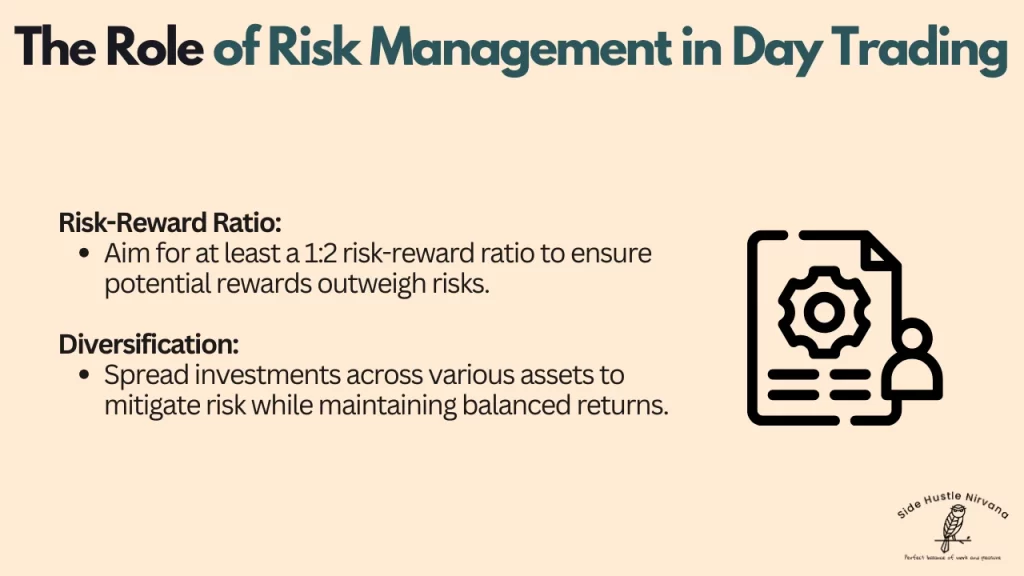
Importance of Risk-Reward Ratio
Understanding and applying the risk-reward ratio is fundamental in day trading. This metric compares the potential profit of a trade against the possible loss, helping traders evaluate whether a trade is worth taking. A common guideline suggests aiming for a risk-reward ratio of at least 1:2, meaning the potential reward is twice that of the potential risk.
Traders should consistently evaluate their risk-reward ratios as part of their trading plan and adjust their strategies accordingly to enhance their long-term profitability.
Diversification as a Risk Management Strategy
Diversification also plays a crucial role in risk management. By spreading investments across various securities or asset classes, traders mitigate the impact of any single loss on their overall portfolio. This strategy helps to balance risk while allowing for opportunities in different market segments.
However, it’s important to note that excessive diversification can lead to diluted returns, so it’s essential to find a suitable balance based on your trading approach.
The Psychological Aspects of Day Trading
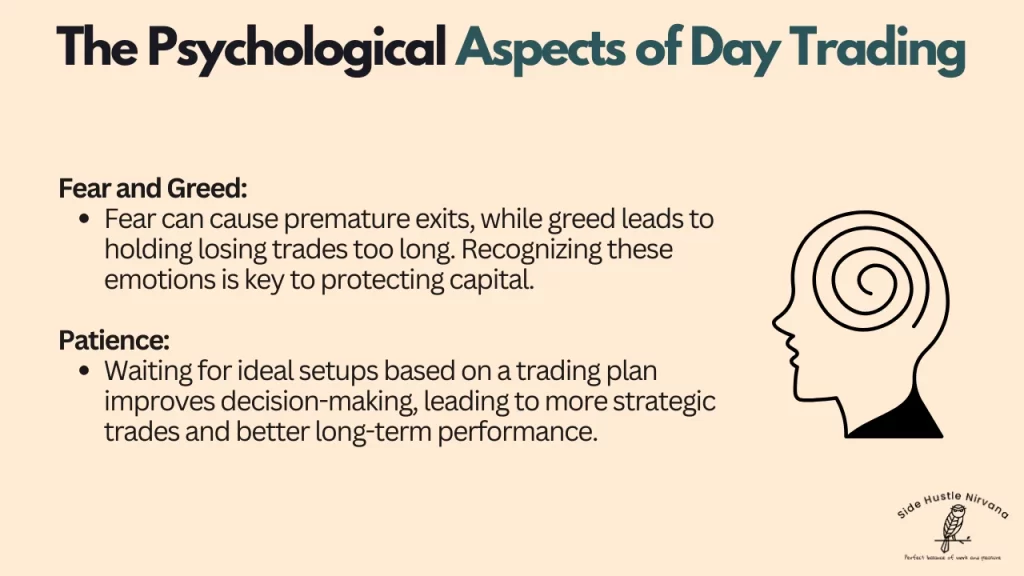
The Impact of Fear and Greed on Trading Decisions
The psychological component of trading cannot be overstated. Fear and greed can cloud judgment and disrupt rational decision-making. Fear may cause a trader to exit a winning trade prematurely, while greed can lead to holding onto losing trades for too long, hoping for a reversal.
Recognizing these psychological influences is crucial to maintaining an effective trading strategy and protecting one’s capital, especially in the volatile environment characteristic of day trading.
The Importance of Patience in Day Trading
Patience is a virtue in day trading, as it allows traders to wait for the ideal setup based on their trading plan. Instead of forcing trades or reacting hastily to market movements, successful traders approach the market with discipline, waiting for the best opportunities to present themselves.
Developing patience can help improve decision-making, often leading to more strategic trades and improved overall performance in the long run.
Essential Day Trading Tools and Platforms
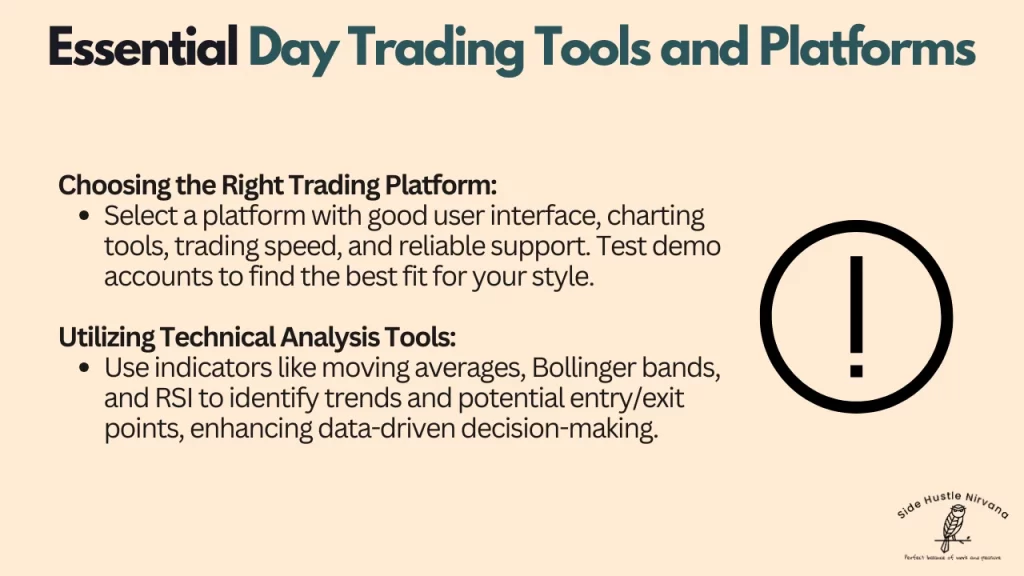
Choosing the Right Trading Platform
Selecting an appropriate trading platform is another critical decision for day traders. With a multitude of options available, it’s essential to consider the platform’s features, including its user interface, available tools for analysis, trading speed, and support for various asset classes.
Look for platforms that offer robust charting capabilities, a variety of orders, and reliable customer support to ensure a smooth trading experience. Testing several platforms through demo accounts can also be beneficial in finding the right fit for your style.
Utilizing Technical Analysis Tools
Technical analysis tools are invaluable for day traders, providing insights into market conditions and potential price movements. Indicators such as moving averages, Bollinger bands, and relative strength index (RSI) can aid in identifying trends and potential entry or exit points.
Familiarizing yourself with these tools can significantly enhance trading strategy, allowing for data-driven decisions rather than speculative trades.
In conclusion, avoiding common pitfalls and embracing sound strategies, a well-defined plan, and strong mental discipline will enhance the likelihood of success in day trading. This meticulous approach can lead to more informed trading decisions, ultimately improving performance and minimizing losses.







